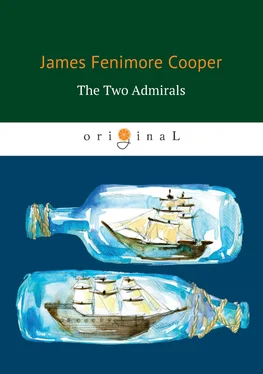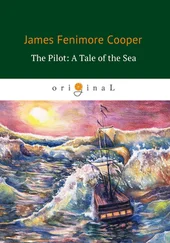Джеймс Фенимор Купер - The Two Admirals
Здесь есть возможность читать онлайн «Джеймс Фенимор Купер - The Two Admirals» — ознакомительный отрывок электронной книги совершенно бесплатно, а после прочтения отрывка купить полную версию. В некоторых случаях можно слушать аудио, скачать через торрент в формате fb2 и присутствует краткое содержание. Город: Москва, Год выпуска: 2018, ISBN: 2018, Жанр: Исторические приключения, Прочие приключения, literature_19, Морские приключения, на английском языке. Описание произведения, (предисловие) а так же отзывы посетителей доступны на портале библиотеки ЛибКат.
- Название:The Two Admirals
- Автор:
- Жанр:
- Год:2018
- Город:Москва
- ISBN:978-5-521-06651-3
- Рейтинг книги:3 / 5. Голосов: 1
-
Избранное:Добавить в избранное
- Отзывы:
-
Ваша оценка:
- 60
- 1
- 2
- 3
- 4
- 5
The Two Admirals: краткое содержание, описание и аннотация
Предлагаем к чтению аннотацию, описание, краткое содержание или предисловие (зависит от того, что написал сам автор книги «The Two Admirals»). Если вы не нашли необходимую информацию о книге — напишите в комментариях, мы постараемся отыскать её.
The Deerslayer
The Two Admirals — читать онлайн ознакомительный отрывок
Ниже представлен текст книги, разбитый по страницам. Система сохранения места последней прочитанной страницы, позволяет с удобством читать онлайн бесплатно книгу «The Two Admirals», без необходимости каждый раз заново искать на чём Вы остановились. Поставьте закладку, и сможете в любой момент перейти на страницу, на которой закончили чтение.
Интервал:
Закладка:
James Fenimore Cooper
The Two Admirals
© T8RUGRAM, оформление, 2018
© Original, 2018
Come, all ye kindred chieftains of the deep,
In mighty phalanx round your brother bend;
Hush every murmur that invades his sleep,
And guard the laurel that o’ershades your friend.
Preface
It is a strong proof of the diffusive tendency of every thing in this country, that America never yet collected a fleet. Nothing is wanting to this display of power but the will. But a fleet requires only one commander, and a feeling is fast spreading in the country that we ought to be all commanders; unless the spirit of unconstitutional innovation, and usurpation, that is now so prevalent, at Washington, be controlled, we may expect to hear of proposals to send a committee of Congress to sea, in command of a squadron. We sincerely hope that their first experiment may be made on the coast of Africa.
It has been said of Napoleon that he never could be made to understand why his fleets did not obey his orders with the same accuracy, as to time and place, as his corps d’armée . He made no allowances for the winds and currents, and least of all, did he comprehend that all important circumstance, that the efficiency of a fleet is necessarily confined to the rate of sailing of the dullest of its ships. More may be expected from a squadron of ten sail, all of which shall be average vessels, in this respect, than from the same number of vessels, of which one half are fast and the remainder dull. One brigade can march as fast as another, but it is not so with vessels. The efficiency of a marine, therefore, depends rather on its working qualities, than on its number of ships.
Perhaps the best fleet that ever sailed under the English flag, was that with which Nelson fought the battle of the Nile. It consisted of twelve or thirteen small seventy-fours, each of approved qualities, and commanded by an officer of known merit. In all respects it was efficient and reliable. With such men as Hallowell, Hood, Trowbridge, Foley, Ball, and others, and with such ships, the great spirit of Nelson was satisfied. He knew that whatever seamen could do, his comparatively little force could achieve. When his enemy was discovered at anchor, though night was approaching and his vessels were a good deal scattered, he at once determined to put the qualities we have mentioned to the highest proof, and to attack. This was done without any other order of battle than that which directed each commander to get as close alongside of an enemy as possible, the best proof of the high confidence he had in his ships and in their commanders.
It is now known that all the early accounts of the man[oe] uvring at the Nile, and of Nelson’s reasoning on the subject of anchoring inside and of doubling on his enemies, is pure fiction. The “Life” by Southey, in all that relates to this feature of the day, is pure fiction, as, indeed, are other portions of the work of scarcely less importance. This fact came to the writer, through the late Commodore (Charles Valentine) Morris, from Sir Alexander Ball, in the early part of the century. In that day it would not have done to proclaim it, so tenacious is public opinion of its errors; but since that time, naval officers of rank have written on the subject, and stripped the Nile, Trafalgar, &c., of their poetry, to give the world plain, nautical, and probable accounts of both those great achievements. The truth, as relates to both battles, was just as little like the previously published accounts, as well could be.
Nelson knew the great superiority of the English seamen, their facility in repairing damages, and most of all the high advantage possessed by the fleets of his country, in the exercise of the assumed right to impress, a practice that put not only the best seamen of his own country, but those of the whole world, more or less, at his mercy. His great merit, at the Nile, was in the just appreciation of these advantages, and in the extraordinary decision which led him to go into action just at nightfall, rather than give his enemy time to prepare to meet the shock.
It is now known that the French were taken, in a great measure, by surprise. A large portion of their crews were on shore, and did not get off to their ships at all, and there was scarce a vessel that did not clear the decks, by tumbling the mess-chests, bags, &c., into the inside batteries, rendering them, in a measure, useless, when the English doubled on their line.
It was this doubling on the French line, by anchoring inside, and putting two ships upon one, that gave Nelson so high a reputation as a tactician. The merit of this man[oe]uvre belongs exclusively to one of his captains. As the fleet went in, without any order, keeping as much to windward as the shoals would permit, Nelson ordered the Vanguard hove-to, to take a pilot out of a fisherman. This enabled Foley, Hood, and one or two more to pass that fast ship. It was at this critical moment that the thought occurred to Foley (we think this was the officer) to pass the head of the French line, keep dead away, and anchor inside. Others followed, completely placing their enemies between two fires. Sir Samuel Hood anchored his ship (the Zealous) on the inner bow of the most weatherly French ship, where he poured his fire into, virtually; an unresisting enemy. Notwithstanding the great skill manifested by the English in their mode of attack, this was the only two-decked ship in the English fleet that was able to make sail on the following morning.
Had Nelson led in upon an American fleet, as he did upon the French at the Nile, he would have seen reason to repent the boldness of the experiment. Something like it was attempted on Lake Champlain, though on a greatly diminished scale, and the English were virtually defeated before they anchored.
The reader who feels an interest in such subjects, will probably detect the secret process of the mind, by which some of the foregoing facts have insinuated themselves into this fiction.
Chapter I
“Then, if he were my brother’s.
My brother might not claim him; nor your father,
Being none of his, refuse him: This concludes —
My mother’s son did get your father’s heir;
Your father’s heir must have your father’s land.”
The events we are about to relate, occurred near the middle of the last century, previously even to that struggle, which it is the fashion of America to call “the old French War.” The opening scene of our tale, however, must be sought in the other hemisphere, and on the coast of the mother country. In the middle of the eighteenth century, the American colonies were models of loyalty; the very war, to which there has just been allusion, causing the great expenditure that induced the ministry to have recourse to the system of taxation, which terminated in the revolution. The family quarrel had not yet commenced. Intensely occupied with the conflict, which terminated not more gloriously for the British arms, than advantageously for the British American possessions, the inhabitants of the provinces were perhaps never better disposed to the metropolitan state, than at the very period of which we are about to write. All their early predilections seemed to be gaining strength, instead of becoming weaker; and, as in nature, the calm is known to succeed the tempest, the blind attachment of the colony to the parent country, was but a precursor of the alienation and violent disunion that were so soon to follow.
Although the superiority of the English seamen was well established, in the conflicts that took place between the years 1740, and that of 1763, the naval warfare of the period by no means possessed the very decided character with which it became stamped, a quarter of a century later.
Читать дальшеИнтервал:
Закладка:
Похожие книги на «The Two Admirals»
Представляем Вашему вниманию похожие книги на «The Two Admirals» списком для выбора. Мы отобрали схожую по названию и смыслу литературу в надежде предоставить читателям больше вариантов отыскать новые, интересные, ещё непрочитанные произведения.
Обсуждение, отзывы о книге «The Two Admirals» и просто собственные мнения читателей. Оставьте ваши комментарии, напишите, что Вы думаете о произведении, его смысле или главных героях. Укажите что конкретно понравилось, а что нет, и почему Вы так считаете.












